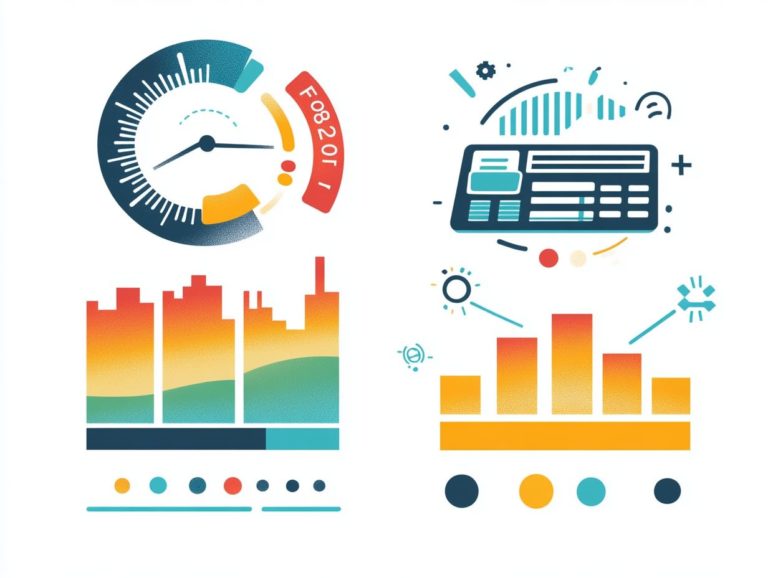5 Credit Score Resources You Need to Know
Navigating the world of credit scores can seem daunting. However, mastering this vital financial tool is essential for your economic well-being.
Whether you’re looking to buy a home or secure a loan, understanding credit scores can truly impact your journey.
This article breaks down the essentials, common myths, and actionable tips for improvement.
Get ready to take charge of your financial future!
Contents
- Key Takeaways:
- 1. Credit Score Basics: Understanding the Numbers
- 2. How Your Credit Score Affects Your Financial Life
- 3. The Different Types of Credit Scores
- 4. How to Check Your Credit Score for Free
- 5. Improving Your Credit Score: Tips and Tricks
- 6. What to Do If You Have a Low Credit Score
- 7. Credit Score Myths and Facts
- 8. How to Maintain a Good Credit Score
- 9. The Importance of Monitoring Your Credit Score Regularly
- 10. Common Factors That Affect Your Credit Score
- 11. How to Dispute Errors on Your Credit Report
- 12. Understanding Credit Score Ranges
- 13. How to Rebuild Your Credit Score After Bankruptcy
- 14. The Role of Credit Counseling in Improving Your Credit Score
- 15. Credit Score Tools and Apps That Can Help You Manage Your Credit
- What Is a Good Credit Score and Why Does It Matter?
- Frequently Asked Questions
Key Takeaways:

- Understanding credit score numbers is crucial for managing your finances.
- Your credit score greatly affects your financial life, from loan approvals to interest rates.
- Familiarize yourself with the different types of credit scores and learn how to check yours for free.
1. Credit Score Basics: Understanding the Numbers
Mastering your credit score is key to managing your financial health. Scores like FICO and VantageScore play a key role in determining your loan eligibility and interest rates.
These scores come from factors like your credit history, outstanding debts, and payment history. Payment history alone contributes about 35% to your score, highlighting the importance of timely bill payments.
Credit utilization is another critical factor that shows the percentage of your available credit being used. Keeping this ratio below 30% can help boost your score.
Companies that check your credit, like Experian, TransUnion, and Equifax, monitor your financial behaviors to ensure the accuracy of your score. Good credit not only helps you get approval; it also opens the door to loans with better terms.
2. How Your Credit Score Affects Your Financial Life
Your credit score shapes your financial landscape. It influences your ability to secure loans and the terms offered by mortgage lenders and credit card companies.
A strong credit score can lead to lower interest rates, saving you money over time. On the other hand, a poor score can limit your financial opportunities and lead to higher debt ratios.
This can result in unfavorable terms, extended repayment periods, and increased financial stress. Recognizing this gives you the power to focus on improving your credit score.
3. The Different Types of Credit Scores
While many types of credit scores exist, the FICO Score and VantageScore are the most commonly used models by lenders. Each provides insights into your credit behavior and risk level.
Understanding the differences between these two models is vital for enhancing your financial standing. The FICO Score ranges from 300 to 850, with scores above 700 generally regarded as good.
VantageScore operates within the same range but may yield different results due to its unique evaluation criteria. It emphasizes recent payment history, making it more responsive to your latest financial behaviors.
This distinction matters; mortgage lenders often prefer FICO Scores for their credibility, while credit card companies may favor VantageScore for its responsiveness. Knowing these differences helps you make informed financial decisions.
4. How to Check Your Credit Score for Free
Checking your credit score for free is an essential step in maintaining your financial health. Services like AnnualCreditReport.com provide straightforward access to your credit reports from the major reporting agencies: Experian, TransUnion, and Equifax without any cost.
To get started, visit the website, fill out a brief form, and download your reports. Regularly monitoring your reports is crucial, as it helps you spot any discrepancies or fraudulent activity that could significantly impact your score.
Pay close attention to details like payment history and credit utilization. Even minor errors can lead to unfavorable assessments.
By staying informed and proactive, you can mitigate risks and take steps to improve or maintain your score, ultimately opening the door to better financial opportunities.
5. Improving Your Credit Score: Tips and Tricks
Improving your credit score is achievable with sound credit habits. This means maintaining a positive payment history and effectively managing your credit utilization.
Keep older credit accounts open to enhance your variety of credit types. Consistently making timely payments showcases your reliability to lenders an essential component in determining your credit worthiness.
Employ effective debt management strategies, like crafting a repayment plan or prioritizing high-interest debts, to alleviate financial strain.
Feeling overwhelmed? Consider seeking credit counseling services. They provide insights and personalized action plans to help you cultivate healthier credit habits, promoting long-term financial stability.
Focus on these actionable steps to enhance your credit score and pave the way for future financial opportunities. Take charge of your financial future!
6. What to Do If You Have a Low Credit Score
If you face a low credit score, taking proactive steps is essential to sidestep high-interest rates and unfavorable loan terms. Seek credit counseling to equip yourself with strategies for managing outstanding debts.
Quickly review your credit reports for any discrepancies; this can uncover errors that may be dragging down your score. Make swift corrections to improve your standing.
Assess your earnings compared to what you owe. Understanding this can help prioritize your repayment strategies effectively.
Engage with professional credit counseling services for tailored guidance, helping you forge a manageable path toward financial stability. Take steps to improve your credit standing today!
7. Credit Score Myths and Facts

Navigating the world of credit can feel like solving a complex puzzle. It’s crucial to differentiate between credit score myths and facts to avoid costly decisions.
You might believe that checking your own credit score could negatively impact it, but that s a common misconception. When you check your score, it s a ‘soft inquiry’ and it won t affect your creditworthiness.
Another myth is that credit scores are updated daily; in reality, they re refreshed on a monthly basis. Understanding the roles of credit reporting agencies like Experian, TransUnion, and Equifax is essential, as they maintain your credit data.
These agencies ensure that accurate and timely information is reflected in your scores, empowering you to make informed financial decisions. Start improving your credit score today for a brighter financial future!
8. How to Maintain a Good Credit Score
To maintain an excellent credit score, cultivate healthy credit habits. This includes making timely payments, keeping your credit utilization low, and ensuring that older credit accounts remain open to positively influence your credit mix.
Regularly monitoring your credit report is crucial. By checking for inaccuracies or signs of fraud, you can tackle potential issues before they escalate.
Setting up payment alerts and using budgeting tools can enhance your financial management. Periodically reassess the types of credit accounts you hold like revolving accounts and installment loans to contribute to a well-rounded credit profile.
Ultimately, consistent vigilance in tracking your credit status and understanding influencing factors will pave the way for long-term financial health.
9. The Importance of Monitoring Your Credit Score Regularly
Monitoring your credit score is essential for understanding your credit health. It allows you to track changes in your report and spot potential issues, like unauthorized credit inquiries.
You have access to tools and services that make this easier, from free apps to comprehensive credit monitoring services that provide alerts and identity theft protection.
By watching your credit score closely, you can catch discrepancies early, saving money on interest rates and enhancing your overall financial well-being. Act quickly to address inaccuracies, as unresolved errors can hurt your creditworthiness.
10. Common Factors That Affect Your Credit Score
Several factors influence your credit score. Payment history and credit utilization are the most significant. The number and types of credit accounts also affect your score, along with the frequency of credit inquiries.
To grasp these elements, explore how each interacts with the credit scoring system. Your payment history reflects your reliability in repaying debts on time. Enhance this by setting up automated payments or reminders to avoid missing due dates.
Credit utilization shows how much of your available credit you’re using; keeping this below 30% signals responsible management. Diverse credit types, such as revolving and installment accounts, can further elevate your score.
Minimize the number of hard inquiries on your report. Hard inquiries occur when you apply for new credit and can affect your score. Frequent applications can raise red flags for lenders. By following these best practices, you can steadily improve your credit profile and create more favorable lending opportunities.
11. How to Dispute Errors on Your Credit Report
Disputing errors on your credit report is essential for an accurate portrayal of your financial health. To get started, you’ll want to reach out to credit reporting agencies to correct any mistakes that could hurt your score!
Gather all pertinent documents, such as bank statements and previous correspondence. When you submit your disputes to agencies like Experian, TransUnion, and Equifax, provide a clear explanation along with your supporting documents. This helps the agencies grasp the nature of the error quickly.
After filing the dispute, stay proactive. Follow up regularly to track the progress of your case and ensure thorough investigations. This diligence will help you achieve a timely resolution and restore your credit standing.
12. Understanding Credit Score Ranges
Understanding credit score ranges is crucial for assessing your creditworthiness. FICO and VantageScore divide scores into different groups such as poor, fair, good, and exceptional credit, each carrying specific implications for your loan eligibility and interest rates.
These categories serve as a valuable tool for evaluating your financial health and the opportunities that lie ahead. A poor score can lead to loan challenges. On the other hand, an exceptional score opens up great lending options.
To boost your score, focus on these key strategies:
- Timely bill payments
- Reducing credit utilization (which means how much credit you are using compared to your total credit limit)
- Regularly reviewing your credit reports for errors
By taking these proactive measures, you can work towards a more favorable credit reputation, unlocking a treasure trove of opportunities and beneficial financial options.
13. How to Rebuild Your Credit Score After Bankruptcy
Rebuilding your credit score after bankruptcy may seem daunting, but it s an attainable objective with consistent effort. This journey requires on-time payments, credit counseling, and the strategic use of credit products to effectively restore your financial reputation.
By prioritizing on-time payments, you can showcase your reliability to creditors, gradually enhancing your creditworthiness. Exploring secured credit options, such as a secured credit card, offers a practical approach to establishing a positive credit history while keeping your spending in check.
Seeking assistance from professional credit counseling can provide you with valuable insights and personalized strategies tailored to your unique financial situation, ensuring that every step you take is both effective and sustainable in the long run.
14. The Role of Credit Counseling in Improving Your Credit Score

Credit counseling is essential for elevating your credit score, providing expert guidance on debt management, financial decisions, and strategies that reflect your unique consumer behavior. This tailored approach can significantly enhance your credit health over time.
These services go beyond just negotiating better terms with creditors; they also help you develop realistic and effective payment plans that harmonize with your income and expenses. By deepening your understanding of personal finances, credit counseling gives you the power to make informed choices, fostering healthier money management habits.
Embracing this proactive approach not only eases immediate financial stress but also equips you with the knowledge to build a solid foundation for future financial security. This ultimately enhances your creditworthiness and brings you peace of mind as you navigate your economic journey.
15. Credit Score Tools and Apps That Can Help You Manage Your Credit
Utilizing credit score tools and apps can significantly streamline your credit management journey. These resources provide invaluable insights into your financial health, alert you to important changes in your credit report, and offer tips for maintaining your credit score or enhancing it.
With a plethora of options at your disposal, you can select tools that cater specifically to your needs, whether you prefer real-time tracking, personalized analysis, or even simulated credit scenarios. Many of these applications come equipped with features like identity theft protection, expense tracking, and educational resources, giving you the power to take charge of your financial future!
By harnessing such technology, you can remain well-informed about your credit health and make proactive adjustments that pave the way for better lending opportunities and enhanced financial wellness.
What Is a Good Credit Score and Why Does It Matter?
A good credit score is defined within specific ranges established by scoring models like FICO and VantageScore. It shows how reliable you are with credit.
This score affects your ability to get loans and the interest rates you will pay. It can significantly impact your financial decisions.
Scores between 700 and 749 are generally good, while those from 750 to 850 are excellent. Maintaining a score in these ranges opens the door to lower interest rates on loans and credit cards.
With a healthy credit score, securing a mortgage becomes much easier! You ll enjoy better terms and lower monthly payments.
Some employers check credit histories during the hiring process. A strong credit score can be an asset in your job search.
How Can Your Credit Score Impact Your Ability to Get a Loan?
Your credit score is vital when securing a loan. It determines eligibility and interest rates, influencing your long-term financial decisions.
A higher credit score, usually between 740 and 850, unlocks favorable loan options and lower interest rates. This leads to significant savings throughout the loan’s life.
If your score dips below 620, expect higher interest rates and stricter terms. This results in noticeably heavier monthly payments.
This stark contrast shows how essential it is to maintain a robust credit history to access better financial opportunities.
What Are the Different Credit Score Models Used by Lenders?
Lenders use various credit score models, mainly FICO and VantageScore. These are designed to assess credit reliability using different methods.
These models consider factors like payment history, credit utilization, and the length of your credit history. They weigh these elements differently.
For instance, FICO emphasizes timely payments, while VantageScore may focus more on recent credit inquiries. This leads to differences in approval rates and interest offers based on lender strategies.
How Can You Maintain a Good Credit Score in the Long Run?
Maintaining a good credit score requires consistent habits. Ensure a positive payment history and manage your credit utilization wisely.
Keep your credit utilization ratio below 30%. This can significantly impact your overall score. Keeping old accounts active also helps; longer credit histories reflect positively on your report.
Regularly check for errors or signs of fraud to address issues quickly. Setting reminders for payments can help maintain that vital on-time payment record.
By adopting these practices, you can build a solid foundation for a robust credit profile that stands the test of time!
What Are the Benefits of Having a High Credit Score?
A high credit score provides many benefits. You gain better loan eligibility and access to favorable terms, which means lower interest rates on mortgages and credit products.
This ultimately leads to better financial health. A strong credit score lowers your monthly payments. It can also lead to significant savings over time.
With solid credit, insurers often offer lower premiums on auto and homeowners insurance. A strong credit record gives you higher credit limits and better rewards on credit cards.
This increases your purchasing power and financial flexibility. It can also be a decisive factor in rental applications, as landlords are more likely to favor tenants with a trustworthy credit history. This enhances your overall housing opportunities.
Frequently Asked Questions

Discover the top 5 credit score resources you can t miss:
The top 5 credit score resources are Credit Karma, AnnualCreditReport.com, WalletHub, Experian, and 5 must-have resources for credit card applicants.
Can I access my credit score for free?
Yes, all 5 credit score resources mentioned above offer free access to your credit score.
Do these resources provide detailed credit reports?
Yes, these resources not only provide your credit score, but also give you access to detailed credit reports with information on your credit history, accounts, and inquiries.
Are these resources safe?
Absolutely! They use top-notch security to protect your personal and credit information.
Do these credit score resources affect my credit score?
No, accessing your credit score through these resources will not impact your credit score.
Can I dispute any errors on my credit report through these resources?
Yes, these resources allow you to easily dispute any errors or discrepancies on your credit report and have them corrected.






